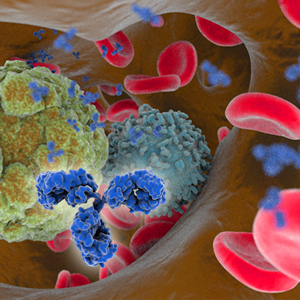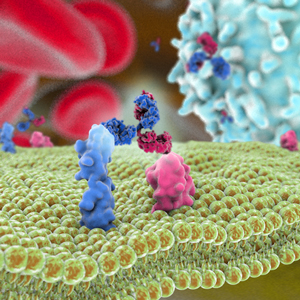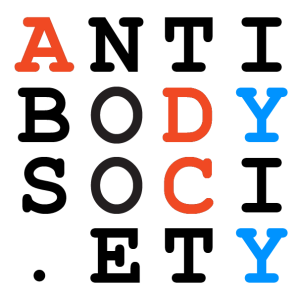 The pace of antibody therapeutics development accelerated in 2017, and this faster pace is projected to continue through 2018. Notably, the annual number of antibody therapeutics granted a first approval in either the European Union (EU) or United States (US) reached double-digits (total of 10) for the first time in 2017. The 10 antibodies granted approvals are: brodalumab, dupilumab, sarilumab, guselkumab, benralizumab, ocrelizumab, inotuzumab ozogamicin, avelumab, duvalumab, and emicizumab. Brodalumab, however, had already been approved in Japan in 2016.
The pace of antibody therapeutics development accelerated in 2017, and this faster pace is projected to continue through 2018. Notably, the annual number of antibody therapeutics granted a first approval in either the European Union (EU) or United States (US) reached double-digits (total of 10) for the first time in 2017. The 10 antibodies granted approvals are: brodalumab, dupilumab, sarilumab, guselkumab, benralizumab, ocrelizumab, inotuzumab ozogamicin, avelumab, duvalumab, and emicizumab. Brodalumab, however, had already been approved in Japan in 2016.
As of mid-December 2017, 10 antibody therapeutics (ibalizumab, burosumab, tildrakizumab, caplacizumab, erenumab, fremanezumab, galcanezumab, romosozumab, mogamulizumab, cemiplimab) were in regulatory review in the EU or US, and regulatory actions on their marketing applications are expected by the end of 2018.
Based on company announcements and estimated clinical study primary completion dates, and assuming the study results are positive, marketing applications for at least 13 antibody therapeutics that are now being evaluated in late-stage clinical studies may be submitted by the end of 2018. Of the 13 candidates, 8 are for non-cancer indications (lanadelumab, crizanlizumab, ravulizumab, eptinezumab, risankizumab, satralizumab, brolucizumab, PRO140) and 5 are for cancer (sacituzumab govitecan, moxetumomab pasudotox, cemiplimab, ublituximab, isatuximab).
Additional antibody therapeutics to watch in 2018 include 19 mAbs undergoing evaluation in late-stage studies with primary completion dates in late 2017 or during 2018. Of these mAbs, 9 are for non-cancer indications (lampalizumab, roledumab, emapalumab, fasinumab, tanezumab, etrolizumab, NEOD001, gantenerumab, anifrolumab) and 10 are for cancer indications (tremelimumab, isatuximab, BCD-100, carotuximab, camrelizumab, IBI308, glembatumumab vedotin, mirvetuximab soravtansine, oportuzumab monatox, L19IL2/L19TNF). Positive clinical study results may enable marketing application submissions in 2018. Brief summaries of these antibody therapeutics are provided in the ‘Antibodies to watch in 2018’ article, which is now available on the mAbs website. A PDF of this open-access article is available here.
Emicizumab granted FDA approval
 Emicizumab (Hemlibra, emicizumab-kxwh, ACE910, RO5534262), a bispecific IgG4 mAb targeting Factors IXa and X, was approved by the FDA on November 16, 2017. The drug, which is administered once a week, was approved to prevent or reduce the frequency of bleeding episodes in adult and pediatric patients with hemophilia A who have developed Factor VIII inhibitors. The biologics license application was granted Priority Review and a Breakthrough Therapy designation. Hemlibra was also granted an orphan drug designation by the FDA.
Emicizumab (Hemlibra, emicizumab-kxwh, ACE910, RO5534262), a bispecific IgG4 mAb targeting Factors IXa and X, was approved by the FDA on November 16, 2017. The drug, which is administered once a week, was approved to prevent or reduce the frequency of bleeding episodes in adult and pediatric patients with hemophilia A who have developed Factor VIII inhibitors. The biologics license application was granted Priority Review and a Breakthrough Therapy designation. Hemlibra was also granted an orphan drug designation by the FDA.
Marketing applications for emicizumab are under review in the European Union and Japan; the European Medicines Agency is reviewing the marketing authorization application under accelerated assessment. Emicizumab was granted an orphan drug designation in Japan for the prevention and reduction of bleeding episodes in patients with congenital factor VIII deficiency with inhibitors. The drug was created by Chugai Pharmaceutical Co., Ltd. and co-developed by Chugai, Roche and Genentech.
The marketing applications for emicizumab include results from the Phase 3 HAVEN 1 (NCT02622321) study and interim analysis of the HAVEN 2 (NCT02795767) study. In the HAVEN 1 study, adult and adolescent patients (12 or older) who had previously received episodic treatment with bypassing agents were randomly assigned in a 2:1 ratio to emicizumab prophylaxis (group A) or no prophylaxis (group B). The primary end point of the study was the difference in bleeding rates between Group A and Group B. Emicizumab was administered subcutaneously at a dose of 3 milligrams per kilogram per week (mg/kg/week) for 4 weeks followed by 1.5 mg/kg/week up to the end of the study. The annualized bleeding rate in Group A was reduced by 87% compared to Group B (2.9 events vs 23.3 events, P<0.001). [1] The HAVEN 2 study is evaluating the efficacy, safety, and pharmacokinetics of subcutaneous administration of emicizumab in hemophilia A pediatric patients with inhibitors.
1. Oldenburg J, Mahlangu JN, Kim B, Schmitt C, Callaghan MU, Young G, Santagostino E, Kruse-Jarres R, Negrier C, Kessler C, et al. Emicizumab prophylaxis in hemophilia A with inhibitors. N Engl J Med. 2017;377(9):809-818. doi: 10.1056/NEJMoa1703068.
The Antibody Society maintains a comprehensive table of approved antibody therapeutics and those in regulatory review in the EU or US. As of November 16, 2017, a total of 10 mAbs have been granted first approvals in either the US or EU in 2017, and marketing applications for a total of 9 antibody therapeutics that have not yet been approved in either the EU or US are undergoing review in these regions.
Please log in to access the table, located in the Members Only section.
Not a member? Please join! Membership is free for students and employees of the Society’s corporate sponsors.
Mogamulizumab enters EU regulatory review
 Mogamulizumab (KW-0761, Poteligeo®), is an IgG1 afucosylated humanized monoclonal antibody targeting CC chemokine receptor 4 (CCR4) expressed on tumor cells of patients with cutaneous T-cell leukemia lymphoma (CTCL), including mycosis fungoides and Sézary syndrome. Afucosylation enhances the antibody-dependent cell-mediated cytotoxicity (ADCC) activity of the mAb. Mogamulizumab was initially approved in Japan in March 2012 for the treatment of patients with relapsed or refractory CCR4-positive adult T-cell leukemia-lymphoma (ATL), and then granted marketing authorization in Japan for the treatment of patients with relapsed or refractory CCR4-positive, peripheral T-cell lymphoma (PTCL) and CTCL in March 2014, and with chemotherapy-naive CCR4-positive ATL in December 2014.
Mogamulizumab (KW-0761, Poteligeo®), is an IgG1 afucosylated humanized monoclonal antibody targeting CC chemokine receptor 4 (CCR4) expressed on tumor cells of patients with cutaneous T-cell leukemia lymphoma (CTCL), including mycosis fungoides and Sézary syndrome. Afucosylation enhances the antibody-dependent cell-mediated cytotoxicity (ADCC) activity of the mAb. Mogamulizumab was initially approved in Japan in March 2012 for the treatment of patients with relapsed or refractory CCR4-positive adult T-cell leukemia-lymphoma (ATL), and then granted marketing authorization in Japan for the treatment of patients with relapsed or refractory CCR4-positive, peripheral T-cell lymphoma (PTCL) and CTCL in March 2014, and with chemotherapy-naive CCR4-positive ATL in December 2014.
In October 2017, Kyowa Hakko Kirin announced that a marketing authorization application (MAA) for mogamulizumab, for the treatment of CTCL in adults who have received at least one prior systemic therapy, is under review at the European Medicines Agency. The MAA includes data from the randomized, open-label, multi-center Phase 3 MAVORIC study (NCT01728805), which evaluated the effects of mogamulizumab versus vorinostat (Zolinza®) in patients with refractory cutaneous T cell lymphoma who failed previous treatment. The study included 372 patients who were randomized to receive either mogamulizumab (1.0 mg/kg weekly x 4 in cycle 1, then every other week until progression) or vorinostat (400 mg orally daily). The primary outcome measure of the study was progression-free survival (PFS), with the target being a 50% improvement over the reference median PFS for vorinostat (median PFS of 254 days for the mogamulizumab arm versus 169 days for the vorinostat arm). In April 2017, Kyowa Hakko Kirin announced top-line results from the MAVORIC study indicating the primary endpoint of PFS had been met. In August 2017, mogamulizumab received breakthrough therapy designation in the US for mycosis fungoides and Sézary syndrome based on results from the MAVORIC study.
The Antibody Society maintains a comprehensive table of approved antibody therapeutics and those in regulatory review in the EU or US. As of November 10, 2017, marketing applications for a total of 11 antibody therapeutics that have not yet been approved in either the EU or US are undergoing review in these regions.
Please log in to access the table, located in the Members Only section.
Not a member? Please join!
Membership is free for students and employees of the Society’s corporate sponsors.
Back in business: gemtuzumab ozogamicin
 Roughly 17 years ago gemtuzumab ozogamicin was first approved by the FDA for the treatment of patients over the age of 60 with CD33-positive relapsed acute myelogenous leukemia (AML), and who were not considered candidates for other cytotoxic chemotherapy.
Roughly 17 years ago gemtuzumab ozogamicin was first approved by the FDA for the treatment of patients over the age of 60 with CD33-positive relapsed acute myelogenous leukemia (AML), and who were not considered candidates for other cytotoxic chemotherapy.
The drug, also known as Mylotarg, was the result of a long-lasting collaboration between Wyeth (acquired by Pfizer in 2009) and CellTech (acquired by UCB in 2004), dating all the way back to 1991. Nine years later it was approved as a single agent under an “accelerated” approval based on the surrogate response rate endpoint that was observed in 142 patients with AML across 3 clinical trials. The approval made Mylotarg the first ADC to hit the US market at the time.
However, things turned quickly for the product. One year into its approval it required a black box packaging warning related to the increased risk of veno-occlusive disease. Initially, the warning was aimed at patients who did not receive bone marrow transplantation, but later the increased frequency of veno-occlusive disease was also observed in Gemtuzumab-treated patients after bone marrow transplantation.
A confirmatory, post-approval clinical trial commenced in 2004, per FDA guidelines for accelerated approval. Results of the randomized Phase 3 SWOG S0106 trial showed a significantly higher fatal induction toxicity rate in gemtuzumab combination therapy group versus the control group receiving only chemotherapy (16/283 = 5.7% versus 4/281 = 1.4%; p = 0.01).
Following the results of SWOG S0106 and the post-marketing experience with the drug, Pfizer decided to withdraw Mylotarg from the market in 2010 at the request of the FDA. The discontinuation was an upset in the ADC field. Upon the withdrawal brentuximab vedotin and trastuzumab emtansine were the only two approved ADCs for years to come. However, the potential of ADC therapeutics has seen a revival and around 60-70 products are in clinical trials at the moment.
Not only the ADC field itself bounced back after this blow, but also gemtuzumab ozogamicin made a recent comeback. Early this year Pfizer resubmitted Mylotarg for regulatory review and both the FDA and the EMA accepted to review the application based on added data from the Phase 3 randomized, open-label ALFA-0701 trial. In this study Mylotarg was evaluated as an addition to the standard induction chemotherapy using an alternative fractionated dosing schedule in 280 adult, de novo, AML patients between 50 and 70 years old. Additionally, a meta-analysis of patient-level data from over 3000 patients in five randomized Phase 3 trials were evaluated.
Now, seven years after discontinuation, gemtuzumab ozogamicin is back in business in the US. The FDA has approved the lower recommended dosage range and the alternative treatment schedule. The authorization now covers single uses or in combination with chemotherapy in a patient population that now also includes adults with newly diagnosed CD33-positive AML, and adults and children 2 years and older with relapsed or refractory CD33-positive AML.
First approval for guselkumab
 On July 13, 2017, the Food and Drug Administration (FDA) approved the biologics license application for guselkumab (TREMFYA). The product, a human IgG1 monoclonal antibody targeting interleukin-23, is indicated for the treatment of patients with moderate-to-severe plaque psoriasis who are candidates for systemic therapy or phototherapy. Approval was based on results from a clinical development program that included more than 2,000 patients in the Phase 3 VOYAGE 1, VOYAGE 2 and NAVIGATE studies. Guselkumab was generated using MorphoSys’ Human Combinatorial Antibody Library technology.
On July 13, 2017, the Food and Drug Administration (FDA) approved the biologics license application for guselkumab (TREMFYA). The product, a human IgG1 monoclonal antibody targeting interleukin-23, is indicated for the treatment of patients with moderate-to-severe plaque psoriasis who are candidates for systemic therapy or phototherapy. Approval was based on results from a clinical development program that included more than 2,000 patients in the Phase 3 VOYAGE 1, VOYAGE 2 and NAVIGATE studies. Guselkumab was generated using MorphoSys’ Human Combinatorial Antibody Library technology.
As of July 13, guselkumab is the eighth antibody therapeutic to be granted a first marketing approval in any country in 2017, following the approvals of brodalumab, avelumab, ocrelizumab, dupilumab, durvalumab, sarilumab and inotuzumab ozogamicin. The Antibody Society maintains a comprehensive table of approved antibody therapeutics and those in regulatory review in the EU or US. As of July 13, 2017, marketing applications for a total of nine antibody therapeutics that have not been approved in any country are undergoing review in the EU or US. In addition, a marketing application for the antibody-drug conjugate gemtuzumab ozogamicin, which was approved in 2000 by the US FDA and subsequently withdrawn from the US market, is undergoing review in the EU and US.
Please log in to access the table, located in the Members Only section.
Not a member? Please join!
Membership is free for students and employees of the Society’s corporate sponsors.

